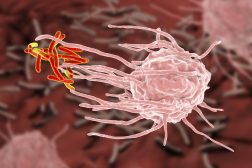Definition
noun, plural: phagocytes
Any of the cells specialized in engulfing and destroying foreign particles, as well as in removing waste particles and cell debris
Supplement
Phagocytes pertain to a group of cells capable of rendering protection against bacteria and other foreign particles inside the body. Through the process of phagocytosis, they are able to destroy microorganisms by engulfing them and encasing them into a vesicle (phagosome), which pinches off from the cell membrane, and then fuses with the lysosomes. When this happens, the foreign particles inside the vesicle are broken down and digested. Apart from microorganisms, the phagocytes ingest cell debris and certain waste particles. Thus, in humans and other vertebrates, they are crucial in keeping the body healthy by destroying pathogens and in removing dead (or apoptotic) cells.
Phagocytes include white blood cells of the immune system, such as monocytes, macrophages, neutrophils, and mast cells. Dendritic cells (i.e. antigen-presenting cells) are also capable of phagocytosis. In fact, they are called professional phagocytes because they are effective at it.1
Word origin: German phagocyten (coined by Dr. Elias Metchnikoff in 1884), from Greek phago- (devouring) + –cyte (from Latin –cyta, from Greek kutosmeaning container, body, hollow vessel)
See also:
- carrier cell
- compound granule cell
- gitter cell
- macrophage
- marchands wandering cell
- neuronophage
- opsonin
- phagocytoblast
- phagolysis
- system of macrophages
Related term(s):
Reference(s):
1Savina A, Amigorena S. Phagocytosis and antigen presentation in dendritic cells. Immunol Rev. 2007 Oct;219:143-56.

